Photographs: Sergei Karpukhin/Reuters
Last week, Claude Arpi explored the rise of the People's Republic of China to its projection as a soft superpower.
China: A full circle 60 years later
Here, he analyses if China has what it takes to be recognised as a true superpower in the modern world.
Sixty years after Mao Zedong proclaimed the birth of the People's Republic of China from Tiananmen Square, China has become a power to reckon with. No doubt about it.
Napoleon Bonaparte, the French emperor, is supposed to have pronounced the famous sentence: 'When China awakes, the world will tremble.'
China being fully awake today, should the world tremble?
Acerbated Nationalism
Certain aspects of the Middle Kingdom's rise to a superpower are indeed scary.
Listen to this: 'The Chinese are different from other races on earth. Hitler's Germany had once bragged that the German race was the most superior race on earth, but the fact is, our nation is far superior to the Germans.'
'Will the centre of the world civilisation shift back to China? As we all know, Nazi Germany also placed much emphasis on the education of the people, especially the younger generation. The Nazi party and government organised and established various propaganda and educational institutions all aimed at instilling into the people's minds the idea that German people are superior, and convincing people that the historical mission of the Aryan people is to become the 'lords of earth' that 'rule over the world'. Nonetheless, Germany was defeated in utter shame, along with its ally, Japan. Why?'
'We reached some conclusions at the study meetings of the Politburo (of the Chinese Communist party), in which we were searching for the laws that governed the vicissitudes of the big powers, and trying to analyse Germany and Japan's rapid growth. When we decide to revitalise China based on the German model, we must not repeat the mistakes they made.'
That was General Chi Haotian, former Chinese defence minister and vice-chairman of China's all-powerful Central Military Commission. Can you imagine any other defence minister in the world speaking such a language? He is not alone in China.
Ultra-nationalism is definitely an impediment for China
Image: Chinese teenagers at an Internet cafePhotographs: Kin Cheung/Reuters
Scott J Henderson, the author of The Dark Visitors -- a remarkable study on Chinese hackers -- says: 'One of the unique aspects of the Chinese hacker organisation is their nationalism, which is in stark contrast to the loner/anarchist culture many associate with the stereotypical Western hacker. They are especially active during periods of political conflict with other nations.'
This nationalism has been exacerbated by the economic rise of China and the success of the Beijing Olympics Games. The leadership conveniently uses this sentiment for its own purposes. But if China is to play a leading role in world affairs, ultra-nationalism is definitely an impediment. A more altruistic and 'internationalist' attitude will have to emerge in the corridors of Beijing for it to earn a respected place on the international scene.
The mantra of China uber alles does not rhyme with modern civilised society.
Ordinary people have no say in State affairs
Image: A Chinese soldier poses for a photographPhotographs: Rupak De Chowdhuri/Reuters
A Totalitarian Regime
For the past 60 years, the People's Republic of China has failed to introduce a modern system of governance. Though the word 'people's' is recurrent in all State institutions in China, since 1949, a single party runs the nation. Ordinary people have no say in state affairs.
Laws or rights, which are acknowledged as universal by world bodies, remain unimplemented by the leaders in Zhongnanhai. Beijing pretends that they are irrelevant to modern China as being a Western invention.
But democracy is not a concept confined to the West. Is President Hu Jintao aware that democracy (from the Greek demokratia, 'power to the people') existed in Asia and particularly in India, long before it was introduced in Greece?
National People's Congress Chairman Wu Bangguo has, however, recently declared that China will 'never go down the devious path' of 'Western institutions'. Whether Beijing agrees to it or not, human rights, basic personal laws or universal suffrage are today values accepted by all non-rogue nations.
The Chinese economy faces a similar problem. It remains controlled by the Communist party: There are 150 party-run monopolies in sectors as diverse as petroleum, steel, banking or telecommunications in China today.
Beijing may open 350 Confucius Institutes the world over, but which type of culture or civilisational values does Beijing pretend to 'export'?
Li Xiguang, a scholar at Tsinghua University, pointed out China's difficulties in marketing its 'values': 'The soft power of a country manifests itself in whether it has the power to define and interpret 'universal values' like democracy, freedom and human rights we must let the whole world hear the stories that Chinese citizens have to tell about their democracy, liberty, human rights and rule of law.'
But when intellectuals speak up, they are immediately arrested. In 1979, Wei Jingsheng wrote about China's Fifth Modernisation on the Democracy Wall in Beijing. Thirty years later, progress seems to have gone in reverse gear in the Middle Kingdom. While Wei advocated individual liberties; ('freedom' was the only 'modernisation' which mattered, improvement of living standards could come later), the fact is that in 2008, hundreds of known writers, intellectuals and professors who signed a manifesto called Charter '08 (asking the Communist leadership to allow the people of China to enjoy civil rights enshrined in United Nations covenants), have been harassed, some even arrested.
Liu Xiaobo, the leader of the Charter '08 movement, has been incarcerated by Communist authorities. As long as this issue is not tackled, China cannot rise to the top. In such cases, it appears that it is the Communist leadership that is trembling.
'The regime in Beijing seems incapable of striking the right note'
Image: A woman argues with a soldier in Urumqi, China's troubled Xinjiang provincePhotographs: David Gray/Reuters
Tibet and Xinjiang
Another issue, which makes Beijing tremble, is the 'unrest in nationalities areas'.
Unless this problem is solved to the satisfaction of all concerned, China will be not able to take the place of a respected power on the world scene. One remembers that in March/April 2008, the Tibetan Autonomous Region as well as the Tibetan inhabitants regions of Qinghai, Gansu, Sichuan and Yunnan witnessed the worse unrest and riots in 50 years.
In July 2009, it was the turn of Urumqi, the capital of Xinjiang, to be in the news. Violence erupted, resulting in at least 200 people dead and some 1,000 wounded. A parallel with Tibet was immediately made.
As on the Roof of the World, tensions have not been a new phenomenon in a Muslim province, which has been flooded (like Tibet) by millions of Han settlers over the past decades. The Uyghurs have sporadically demonstrated their resentment against Han colonisation.
The Communist Party's local leaders were quick to blame the incident on a 'foreign' hand. Xinjiang's Communist boss and Politburo member Wang Lequan declared that the riots in Urumqi showed separatist World Uyghur Congress leader Rebiya Kadeer's violent and terrorist nature.
In March 2008 in Tibet, the Dalai Lama was similarly called a 'wolf in monk's dress' by Zang Qingli, Tibet's Communist party chief. The regime in Beijing seems incapable of striking the right note.
Facts are in, but who is ready to listen?
Image: Women confront security forces in Urumqi, XinjiangPhotographs: Reuters
The lawyers point out 'major errors in government policy' after the March April 2008 protests. One was encouragement of racist sentiment towards Tibetans: 'The excessive response of the government all over Tibet was to regard every tree and blade of grass as a potential enemy soldier.'
According to them, this further strained the relations between the local Tibetans and the Han migrants.
One of their conclusions is: 'Understanding is a precondition for discussion, unity and development. There must be a change in thinking and an adjustment in thinking behind the current nationality theories and policies.'
The report found that in Tibet, the difficult terrain has created 'locally fixed power networks, which inevitably led to a high incidence of corruption and dereliction of duty "Foreign forces" and "Tibet independence" are used by many local officials as fig leaves to conceal their mistakes in governance and to repress social discontent.'
The final conclusions are not far from the Tibetan Diaspora's views: 'Earnestly listen to the voices of ordinary Tibetans and on the basis of respecting and protecting each of the Tibetan people's rights and interests'.
For the past 50 years, the Communist party has been unable to deal with these problems. The negotiations with a good-willed Dalai Lama have never even taken off.
Beijing is getting even more authoritarian
Image: Chinese soldiers at a paradePhotographs: Reuters
Several other aspects make China unstable
Sixty after its foundation, it appears that the People's Republic of China is pulled towards an ever greater authoritarian way of functioning.
Take the post economic crisis situation: With the huge expenditures to be incurred on infrastructure, the state enterprises only will benefit, thereby reinforcing the party and in particular the Politburo Standing Committee.
The People's Liberation Army's role is also constantly reinforced (allowing people like General Chi Haotian to get away with his declarations). Today, the PLA plays a role not only in China's external defence, but has become indispensable to suppress some 100,000 protests, riots and unrest which occurred annually in the mainland due to environmental issues, corruption or unemployment problems. This does not take into account the restive situation in Tibet or Xinjiang.
Willy Lam in his paper on 'quasi-superpower diplomacy' has remarked: 'The CCP (Chinese Communist Party) leadership's refusal to give up Maoist norms like the 'party's absolute leadership over the armed forces' has dented the global appeal of the China model -- and detracted from the viability of Beijing's quasi-superpower diplomacy.'
Support to Rogue States
A superpower is usually able to help sorting out regional, if not international issues.
Beijing has tried its hand in the Korean imbroglio. One of the reasons why Beijing has not been successful so far is that the Communist authorities are reluctant to be tough on North Korea when required.
In several cases, the Chinese leadership has sided with rogue states like Myanmar, Sudan, Angola or Zimbabwe.
Despite its long-friendship with Teheran or Islamabad, Beijing has never been able to convince these States to follow the rules accepted by all other nations.
'Chinese moves are watched by a trembling West'
Image: A visitor's hands hover over a map of China at an exhibitionPhotographs: Yuriko Nakao/Reuters
China is rich. Several Chinese State corporations are on a 'going out' scheme to buy strategic assets the world over. It is not too difficult in Africa or Latin America where bribing a few political leaders helps, but it is less easy when it comes to Western multinationals.
These mergers and acquisitions have usually been related to oil and other raw materials. Chinese moves are watched by a trembling West. Is a return of the Yellow peril being witnessed?
Petrochina, Sinopec and CNOOC, China's oil monopolies have already been involved in overseas mergers and acquisitions worth $12 billion (about Rs 60,000 crore) in the first half of 2009 (80 percent more than during the same period in 2008).
China's Aluminum Corporation (Chinalco) tried recently to acquire 18 percent (worth $19.5 billion or about Rs 97,500 crore) of the British-Australian mining corporation Rio Tinto. Shivers were felt around the world. If Beijing had succeeded, China would have had to access to most of the iron-ore and copper mines in Australia.
It is good reason for the world to tremble.
Red-line 'barking' diplomacy must end
Image: The Dalai LamaPhotographs: David Gray/Reuters
Drawing Red Lines
Beijing's diplomatic assertiveness is well known. The Communist leadership uses a term: 'Red-line Diplomacy'.
Beijing 'draws red lines' around issues it considers vital to its core interests.
Strangely, it often uses the Panchsheel principles for its purpose, particularly 'non-interference in the internal affairs of other countries' (even giving the paternity of the formula to former premier Zhou Enlai).
This principle are quoted not only for Tibet, Xinjiang, or when the Dalai Lama is to visit a foreign country, but also when India wants to deploy troops in Arunachal Pradesh or when a world body wants to question Beijing on human rights.
The spokesperson at the Chinese ministry of foreign affairs then barks so loudly, that the interlocutor starts trembling and generally backs out (this even happened to President Nicolas Sarkozy of France after he 'dared' to meet the Dalai Lama in Poland last year).
This Red-line 'barking' diplomacy may be a 'Chinese characteristic', but it is certainly not the attribute of a mature State, a superpower-to-be. During the next 60 years, China has a lot of progress to make in these fields and many others.

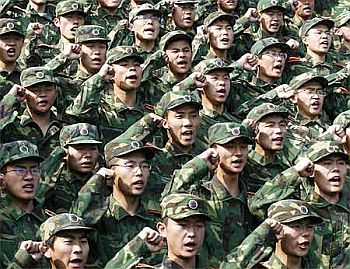


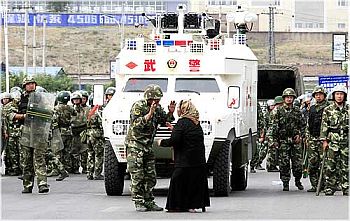
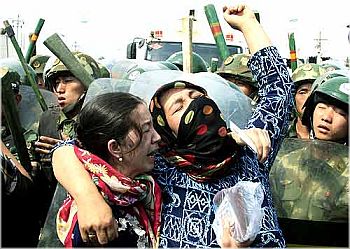
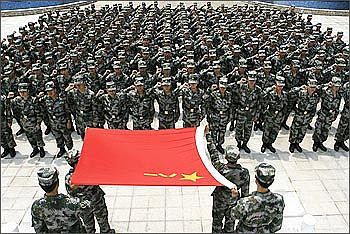
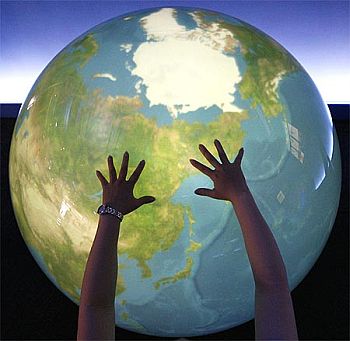
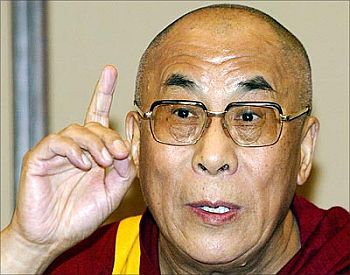
article